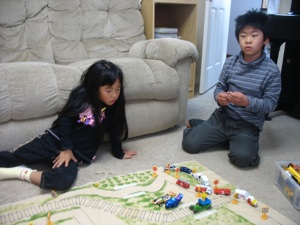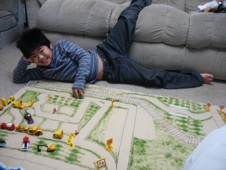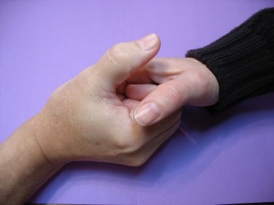Rules that are Unhelpful
-
1.behave
-
2.help your mother
-
3.don’t fight
These are all too vague for the child to know what is expected
Rules that are Too Hard
-
1.clean your room
-
2.clean up after supper
-
3.clean the bathroom
These are too big of a job for an elementary aged child, but if broken down into smaller tasks, can be done. For example, “clean the bathroom” could be broken down into 1)clean the mirror, 2)clean the sink, 3)clean the toilet, 4)sweep the floor. Then it becomes understandable and doable. First they need to be taught, then do it together, and finally they can do it alone. But they always need their work checked, or they may choose to cut corners.
Rules about relationships
-
1.Obey your parents and teachers
-
2.Do not hurt other people (kick, hit, bite, etc)
-
3.Do not hurt people with words (calling names, spreading rumors, saying “I hate you” etc. including cell phones, if you have already given them one)
-
4.If you break something, you pay to replace it
-
5.If someone asks you to stop an annoying activity, you have to stop, as long as it is a reasonable request. (Our family used the phrase, “Please stop.” It stopped a lot of fights before they started. Mom and Dad were the judges of whether it was reasonable or not.)
-
6.Ask for permission before borrowing something
-
7.Don’t steal
-
8.Don’t lie
-
9.Respect your parents (don’t talk back, etc.)
Posting a list of rules and consequences on the wall can be helpful for elementary aged children. If your children complain about any of these, call a family meeting to hammer out what the kids consider more fair rules and consequences. Sometimes they can have really good ideas. Of course, Mom and Dad have the final say, even if the kids object, but almost always some kind of compromise can be worked out.
If your children have not started doing chores yet, don’t wait another day to get them started!! Some parents decide to postpone making their children help around the house until they are older because it takes way less time to do it yourself than to spend the time it takes to teach your children and to monitor the quality of their work. This is a big mistake. First, they begin to think that all these things are Mom’s jobs, and they don’t have to do anything. Second, it is way harder to make them start working if they have gotten used to having everything done for them. Third, you are missing out on valuable teaching time, since there are so many life skills to teach them before they leave home. If they start doing chores at a young age, by the time they are in 4th or 5th grade, they can be a huge help (but not if you are just beginning to teach them!) They need to understand that everyone needs to help out around the house--no one is exempt. It is a great way to teach them responsibility.
Rules about going out
-
1.Be home on time (set time)
-
2.Call your parents if you are going to be late or want to go someplace else
-
3.Ask permission before going anywhere
-
4.Never go to_______________________
Rules about T.V., movies, and video games
-
1.Do not spend more than 30 minutes per day watching T.V. or video games
-
2.Only watch approved T.V. shows
-
3.Turn off the show if it gets violent or has sexual content
-
4.Get permission before watching a movie, even if you are at a friend’s house
-
5.Do not watch T.V. until homework is done
Rules for home responsibilities
-
1.Do your daily chores by_____
-
2.Do your weekly chores by____
-
3.Clean up after yourself in the common living spaces (bathroom, living room, foyer, car, yard)
-
4.Help clean up after meals
-
5.Clean your room daily (make bed, put away toys, dirty clothes in hamper)
-
6.Clean your room weekly (vac, dust, change sheets, take trash, etc)
-
7.Do your homework
-
8.Personal Hygiene (if they don’t already automatically brush their teeth, take a bath, etc. posting a check list may help)
Posting Rules
Only post rules that your children have trouble keeping. Keep the lists short, and include the consequences as a reminder of what will happen if they don’t keep the rules. Put the lists where they will be most helpful--T.V. rules near the T.V., hygiene check list in the bathroom, daily chores check list in the kitchen, etc.
Parenting > Discipline > Sample Rules for Elementary Aged Children
Fighting
Teasing, needling, annoying...no one should have to live with bullying, especially not at the home. The home needs to be a safe haven for everyone, but it can’t be if one sibling is always pushing the other one’s buttons. Why do kids do it? I don’t know--just sin nature I suppose. I think boredom plays a role as well...there’s nothing better to do, so it’s how they entertain themselves. Then it becomes a habit. Whenever they get a chance, each child lashes out in anger at the other one to get back for the last time she was harassed. A hostile atmosphere permeates the whole house. Not a very nice place to live, right?
The “Please don’t” rule can nip a lot of fights in the bud. If someone invokes the words, “Please don’t” the other person has to immediately stop. That rule works well until the child demands that the sibling stop practicing the piano, or to not step on his car map that covers the whole floor. Then the corollary kicks in, so the sibling can ask Mom or Dad if that is a reasonable request. If Mom deems it reasonable, the sibling has to abide by the “Please don’t” rule. If Mom deems it unreasonable, then the sibling is free to continue. These checks and balances go a long way to restoring peace in the home. If an older brother is constantly teasing a younger sibling, they have nowhere to run to get away from it since home is where they spend most of their time. Invoking this phrase means the younger child can escape from the constant barrage. Or a wrestling match gets too intense and someone is about to get hurt--invoking this phrase can end the tussle peacefully and they can find a new way to entertain themselves. This rule covers a multitude of sins, so you don’t have to invent a new rule every time the bored child comes up with a new way to entertain himself.
“Please don’t” is NOT a magic word unless you make it one! Children don’t stop doing something just because they are asked to, especially if it is a sibling doing the asking. The key here is for you, the parent, to back up the child with consequences so the sibling will stop--you hold the key to making it happen. (It can be something as simple as sending the offender out of the room for 15 minutes) Otherwise, it will be a plea falling on deaf ears, and a cruel mockery rather than a rule. My daughter recalls how shocked she was when she was visiting in a home and heard one child say, “Please don’t” and nothing happened--the pestering continued. The children in a home like that are not likely to grow up as good friends.
Down through the years, many people have commented on how close our children are. I think it is due in part to this rule. I also did things proactively to encourage camaraderie by occasionally telling the older ones to play with the younger ones to help bridge the age gap and gender gap. They came up with creative ways to play together (including accidentally breaking the slats on a bed one time. A price well worth camaraderie in my book!) When they got older, I occasionally foot the bill for outings to encourage them to hang out together. When the older ones went off to college, I encouraged them to write the younger ones and reminded them of birthdays coming up. Now, even as young adults, they are good friends and enjoy each others company.
Parenting > Discipline > Sample Rules for Elementary Aged Children
















